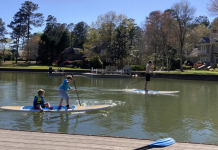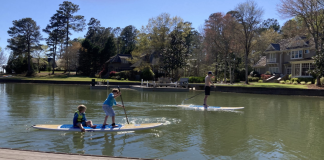Risk analysis is my jam. You could put me in a room, and I could both identify and prepare for any risk that might even remotely be presented.
 We had the monitor to alert us if the boys’ breathing became irregular, we were early adapters to child-proofing, and I still cut up hot dogs for my 2 ½ year-old so they don’t pose a choking hazard.
We had the monitor to alert us if the boys’ breathing became irregular, we were early adapters to child-proofing, and I still cut up hot dogs for my 2 ½ year-old so they don’t pose a choking hazard.
What mom hasn’t felt her risk antennae become a bit sharper after having kids? From the minute our child comes into our life, every cell in our body reprograms with a new mission – keeping him or her safe.
But that’s hard. We can’t always be there. Nor do we want to be. Therefore, the best way we can protect our kids is to prepare them.
However, this can lead to some tough conversations.
It’s time to talk.
As a mother to a very curious two-and-a-half year old, how to best prepare him for the dangers this world can present has weighed heavy on my mind. How do I talk to him about stranger danger, body safety, etc. in a way that will prepare him, be age appropriate, and more importantly make him feel secure and not scare him?
That’s what kept this momma up at night. And that’s the question that launched this series on how to have tough conversations with your kids. I took my questions to the experts to ask for tips on how have these conversations with our kids in a way that will educate and prepare them…and hopefully let us sleep (at least a little better) at night!
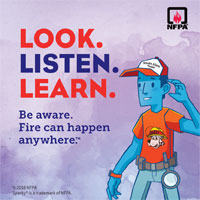 With this week being National Fire Prevention Week, it is a great opportunity to talk to your child about fire safety. Richard Linn, Senior Fire Inspector for the Hoover Fire Department (HFD) was kind enough to help get us started.
With this week being National Fire Prevention Week, it is a great opportunity to talk to your child about fire safety. Richard Linn, Senior Fire Inspector for the Hoover Fire Department (HFD) was kind enough to help get us started.
During October, Linn is part of a HFD team that visits each of the 10 Hoover elementary schools to engage and educate children ranging from kindergarten to fifth grade about fire safety.
The importance of talking to your child about fire safety.
“The importance of education on fire safety shows when we still have lives being lost to fires,” said Linn.
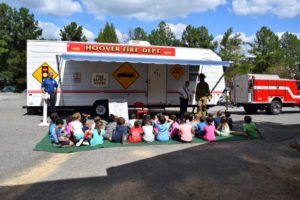 So far in 2018 in Alabama, there have been 47 fire fatalities, ranging in age from 2 to 96 years old.
So far in 2018 in Alabama, there have been 47 fire fatalities, ranging in age from 2 to 96 years old.
It is important to have this conversation early. As Linn, and most parents can attest to, children are learning at a much faster pace than we often give them credit for. A child’s desire for this knowledge starts at an early age.
In his 12 years of visiting schools and talking to students, Linn has been amazed at how much the children understand and retain.
It is never too early.
Conversation keys.
Linn suggests three main topics of discussion:
- Burn awareness – According to the National Fire Protection Association (NFPA), the most fire-related injuries come from burns. Talk to your child about household items that could cause burns like stoves, lighters, irons, hot water, etc.
- Smoke alarms – Talk to your child about what a smoke alarm is, let them hear the sound of your smoke alarms, discuss when smoke alarms go off, and what it means.
- Family safety plan – Once your child understands what the smoke alarm is, talk to your child about your family’s safety plan for getting out of the house should the smoke alarms go off. Discuss a family meeting place and the importance of staying out once getting out.
Engaging and educating your child.
In Linn’s experience, the key to an effective conversation is engagement – making the child an active participant in the conversation. This often makes what can be a scary topic, much less so because it gives the child ownership over the issues being discussed. Below are some examples to get you started:
- When talking about burn awareness, take your child around the house as you point to different items. Ask your child if each presents a risk.
- When discussing smoke alarms, let your child hold the smoke detector and push the button to help you test the alarm so he or she knows what it sounds like. Or, let your child find the date on your smoke alarm to make sure it is less than 10 years old.
- Make the creation of your safety plan a family affair. Ask your child to brainstorm two ways out of their room and to help pick the family’s meeting place outside.
Resources.
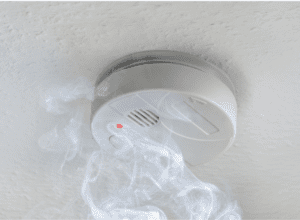 Check out Sparky.org for great ways to further engage your kids of all ages using games, videos, and activities on each of the topics above. They even have seasonal activities like a coloring page about Halloween safety and a Sparky pumpkin template. The site also offers additional resources for parents.
Check out Sparky.org for great ways to further engage your kids of all ages using games, videos, and activities on each of the topics above. They even have seasonal activities like a coloring page about Halloween safety and a Sparky pumpkin template. The site also offers additional resources for parents.
If you’re looking for some more in-depth information, check out NFPA’s Public Education website. It offers parents some great resources by topic, safety tip sheets, and even comprehensive lesson plans through its Sparky School House.
However, your best resource may be closer than you think. Linn suggests taking your kids to your local fire station. What kid wouldn’t love that? Let your child meet and talk with the firefighters and see their uniforms and equipment so they won’t be afraid.
Have you talked to your child about fire safety? What did you find helpful?




